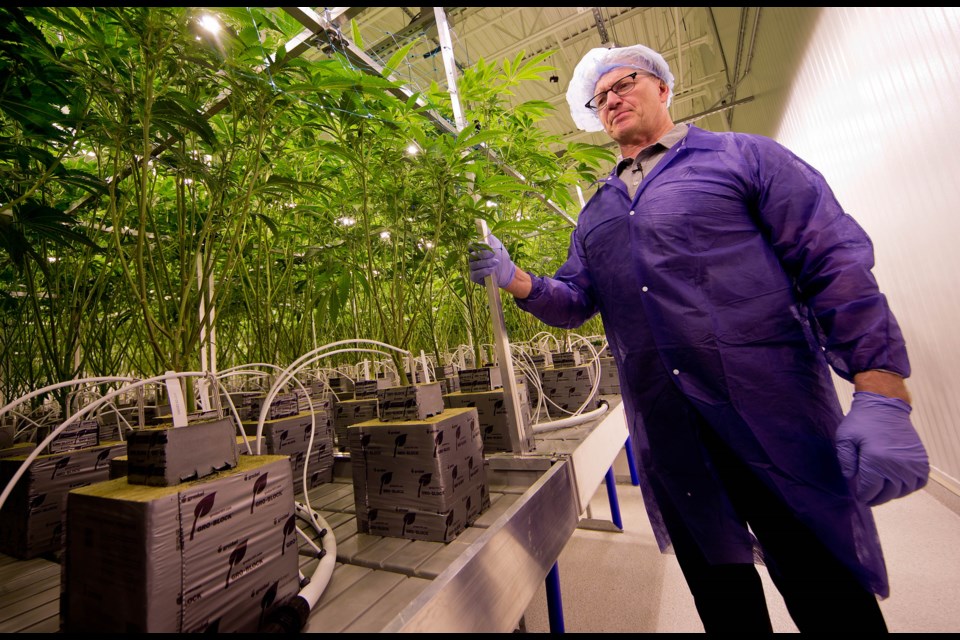Alberta-based Atlas Growers and Biotechnologies is teaming up with Harvard Medical School to supply cannabis products for chronic pain and neurological conditions research.
The medical cannabis producer made the announcement on May 28 during a media tour of its 38,000-square foot facility, which is located an hour from St. Albert. Atlas is now the founding partner for what is being called the International Phytomedicines and Medical Cannabis Institute at Harvard.
The company boasts that this collaboration is the most significant institutional partnership with the medical cannabis industry to date.
Dr. Wil Ngwa, director of Harvard Global Health Catalyst, told media in a news conference via Skype that research on the effects of marijuana is limited, with some of the research that has already been done contradicting other research.
“People are using different strains, people don’t really do quality assurance to make sure that the product (they’re) using is the same,” he said. “Everybody does controlled studies, which are not just anecdotal. So there are some really good scientific studies with clinical trials but the problem has been some limitations to those standards.”
Ngwa said Harvard is excited to be working with Atlas because of the quality assurance the company is providing and mentioned the research can lead to new products to help people in need.
“(We) want everybody to have access to pain medication,” he said. “There are many regions in the United States and even across the world where people die of cancer. This will really level the playing field. From my perspective, I’m very excited about this because it can develop new products that are more accessible to a wider population.”
Clinical trials are expected to start sometime in 2020. Ngwa said they didn’t want to start right away as researchers are currently doing some work with animals to get a baseline of data before moving onto patients.
The research appears to be focusing on chronic pain experienced by cancer patients. Ngwa said 50 to 90 per cent of cancer patients suffer from chronic pain with many asking their doctors if they can take cannabis in order to get some relief.
He added researchers are looking for ways to quantify the levels of pain people experience more so than the standard one to 10 range.
“You have to evaluate that in different ways, using different metrics and then combine those results to be able to show that, OK, this is how effective it is,” Ngwa added.
To help with the research, Atlas has committed to providing US$2.2 million over a three-year period in addition to the various cannabis products.
Jeffrey Gossain, chief operating officer with Atlas, explained the company’s initial shipment in July will be dry flower but after that, it will be oil.
“Part of the relationship with Harvard is going to be that any new IP (intellectual property) that’s developed ... can be shared between the two parties,” he added.
St. Albert’s Jim Hole, who is vice president of cultivation, described Atlas as always being a science-based company, which is one of the reasons why he signed up to work with them.
“I like to build companies that are progressive and I need that evidence-based (science),” he said. “Teaming up with these guys and the commitment Atlas has to the science of the cannabis crop, I think is huge.”
The cannabis Atlas produces is done in its facility in Lac Ste. Anne County. There are approximately six rooms in the facility dedicated entirely to the growing of cannabis. Each room is maximized to hold 1,120 plants with specialized lighting and climate control in place to keep growing consistent.
The estimated worth of a single room filled with the once-illegal plant is nearly $975,000.
“Out of this room, we would be able to harvest in the range of 150 kilograms of dry flower,” president and CEO Sheldon Croome said.
“If you want to see what the harvest would be of one room, which we’re harvesting every two to three weeks, (it would be) 150 kilos, so that’s 150,000 grams. Right now, we’re selling in the market (value for a gram) between $10 to $15 in the store. That’s not our wholesale rates but that’s essentially in the store what they would be selling for a reasonable amount of revenue for a harvest.”
The facility (terms like grow-op are frowned upon) operates similar to a prison, as all the doors require security keys to open them and security cameras are everywhere.
Sanitation is also a high priority. Before even getting close to any plant life, visitors have to take an air bath where powerful hoses blast any unwanted particles off clothes. Following the impromptu bath, everyone must wear hairnets and lab technician robes over their clothes including shoes.
All this is to ensure the marijuana plants don’t get contaminated in some way.




